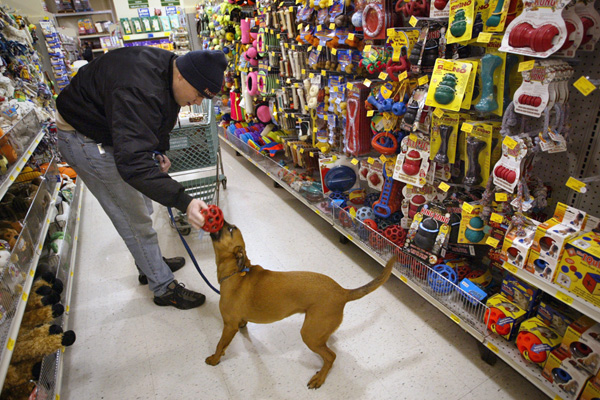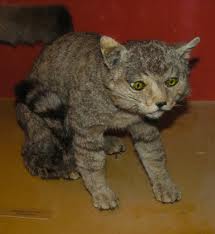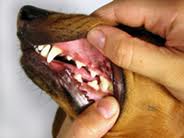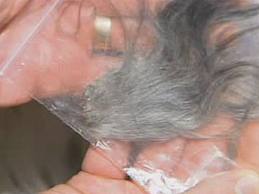
Animal Radio® Show #644
 Kristin Chenoweth Guests
Kristin Chenoweth Guests
She's a rising star on ABC's new hit series GCB. Kristin Chenoweth loves her animals, especially her dog Maddie. She even formed a non-profit organization named after Maddie to help animals all over the world. This little "hot tamale" continues the Season of Stars on Animal Radio®
 Don't Call Him Prince
Don't Call Him Prince
Prince Lorenzo Borghese doesn't want to be known for his title. He doesn't want to be remembered for his roll on ABC's The Bachelor. He wants people to know him for his line of Royal Pet Products. He's joins us to explain his roll in ending the needless euthanasia of pets simply because they're homeless.
What's Up With Dog TV?
Would you pay $4.99 a month for a cable TV channel just for your dog? Chief Content Creator of DogTV Ron Levi hopes so. He believes that his new channel is the answer for separation anxiety and noise related stress issues. Now you have to fight your dog for the remote.

It seems like there's been a lot of new uses for Panda Poo ever since the rising popularity during the Beijing Olympics. Now a Chinese business man is trying to strike it rich by selling an organic tea he grew in Panda Poo. Each cup of his tea costs about $200.
Listen to this Animal Radio® episode
Animal Radio® Show #643
 Iron Chef Cat Cora Guests
Iron Chef Cat Cora Guests
No stranger to the Food Network„¢ - Iron Chef Cat Cora is not only a pro in the kitchen, she's an outspoken animal advocate. She wants you to know that baby seals are still being clubbed over the head in Canada - and she wants to put a stop to it.
Saying Goodbye
Deciding when a close family pet should be euthanized isn't an easy task. Dealing with the death of your furry companion is inevitable and can be the hardest thing you've ever had to deal with. Gary Kowalski imparts great wisdom on the subject.
 HBO Cancels Dustin Hoffman Series
HBO Cancels Dustin Hoffman Series
HBO cancelled production of its series "Luck" after an injured horse had to be euthanized. This is the third horse death during the filming that has garnered controversial publicity because of the American Humane Association's "No Animals Were Harmed" accreditation.
 There's No Place Like Home
There's No Place Like Home
Toto, the Cairn Terrier won't become the Kansas State Dog after all. PETA (People for the Ethical Treatment of Animals) has recommended the state house not hear legislation fearing that it would spurn puppy mill production of the breed.
Listen to this Animal Radio® episode

Get 10% off by using promo code "animal"
Animal Radio® Show #642
 Dancing With Nascar
Dancing With Nascar
Animal Radio's Season of the Stars continues with Dancing With The Stars Judge Carrie Ann Inaba and NASCAR's Cory Joyce. Both have a special relationship with their pets and spend a lot of time helping animal organizations.
Plastic Surgery For Your Pet
What lengths will pet owners go to help their pets? How about plastic surgery. Our own Dr. Debbie just finished performing a vaginal tuck on a dog. As strange as this may sound, it has provided the pup with a disease-free life. Another couple in England paid $16,000 for a tummy-tuck and face-lift.
 50.96 Billion Spent on Pets in 2011
50.96 Billion Spent on Pets in 2011
For the first time in history, more than $50 Billion has gone to the dogs, cats, canaries, guppies and the like according to the American Pet Products Association. The pet industry is a major attraction for entrepreneurs and investors looking for creative and innovative products.
 Freeze Dry Your Pet
Freeze Dry Your Pet
When our pets die, it is often a painful loss. Now, that emotional connection between owner and pet has many animal lovers turning to a growing trend, but not without controversy, of freeze drying them.
Listen to this Animal Radio® episode

Animal Radio® Show #641
Davy Jones
 Monkees' Davy Jones recorded an interview with Animal Radio® before he died. It was scheduled to be a part of Animal Radio's Season of Stars. We tribute him by airing the interview which will send chills down your spine. He starts out by saying "most people think I'm dead, I'm not, I'm just out there." His love for his animals, horses in particular, is quite evident. He died alongside his horses. Don't miss this amazing interview of an incredible pop icon.
Monkees' Davy Jones recorded an interview with Animal Radio® before he died. It was scheduled to be a part of Animal Radio's Season of Stars. We tribute him by airing the interview which will send chills down your spine. He starts out by saying "most people think I'm dead, I'm not, I'm just out there." His love for his animals, horses in particular, is quite evident. He died alongside his horses. Don't miss this amazing interview of an incredible pop icon.
Worst Pet Teeth In America
 Banfield Applied Research & Knowledge (BARK), determined a list of states with the "Worst Pet Teeth in America." Using Banfield's patient database of over 800 hospitals, states were ranked by the percent of dogs and cats diagnosed with dental disease. Worst Pet Teeth in America: 1. Minnesota; 2. Utah; 3. South Carolina; 4. South Dakota; and 5. Rhode Island.
Banfield Applied Research & Knowledge (BARK), determined a list of states with the "Worst Pet Teeth in America." Using Banfield's patient database of over 800 hospitals, states were ranked by the percent of dogs and cats diagnosed with dental disease. Worst Pet Teeth in America: 1. Minnesota; 2. Utah; 3. South Carolina; 4. South Dakota; and 5. Rhode Island.
Pet Custody Cases On Rise
 Custody cases involving pets are on the rise across the country. In a 2006 survey by the 1,600-member American Academy of Matrimonial Lawyers, a quarter of respondents said pet custody cases had increased noticeably since 2001. Pets are considered property in every state in the country. For years, they have been divvied up like furniture during divorce proceedings. But times are changing.
Custody cases involving pets are on the rise across the country. In a 2006 survey by the 1,600-member American Academy of Matrimonial Lawyers, a quarter of respondents said pet custody cases had increased noticeably since 2001. Pets are considered property in every state in the country. For years, they have been divvied up like furniture during divorce proceedings. But times are changing.
Listen to this Animal Radio® episode
Animal Radio® Show #640
 He Cloned His Dog!
He Cloned His Dog!
George Semel cloned his dog after it was mauled by a Rottweiler. Now the Koreans are holding his three cloned puppies for ransom. They want more than the $50,000 he was initially asked to pay. And what proof does he have that these are actually cloned animals? None yet. Join us as TLC's "I Cloned My Pet" films this compelling interview.
 Elayne Boosler Guests
Elayne Boosler Guests
Yes, she's one of America's most outstanding comics, but she's also an animal advocate with her own 501c3 organization created to help the smaller shelters save animals. Find out why she hates the Humane Society of the United States and the ASPCA.
Cemetery Welcomes Man's Best Friend
Families have been known to skirt cemetery rules in trying to reunite Fido or Patches with their owners, slipping a tiny tub of ashes into a casket or sprinkling their remains at a grave site when no one's looking. But come spring, animal lovers won't have to be so sneaky anymore in one state.
 Should Groomers Be Licensed?
Should Groomers Be Licensed?
After several news stories about bad groomers giving bad cuts or even cutting off ears and super-gluing them back on, a few legislators want to make licensing groomers mandatory. The crusade continues in California.
Listen to this Animal Radio® episode
Animal Radio® FREE Pets & People Drug Discount Card
SAVE NOW ON ALL UNINSURED MEDS!! For both you and your pet!
![]() You may already know how expensive pet medication can be. Especially when pet insurance doesn't cover drugs.
You may already know how expensive pet medication can be. Especially when pet insurance doesn't cover drugs.
All of us at Animal Radio® are doing our best to help out. After all, we're all in the same financial boat and don't want the pets to suffer because a medicine's cost is prohibitive. We made a deal with the top pharmacy benefits managers. Here's what we came up with:
- The Animal Radio® Pets & People Drug Discount Card is FREE.
- It offers 15-55% discount on pet medicines or uninsured human medicines.
- It's usable at almost 60,000 pharmacies, including Walgreens, Wal-mart, Rite-Aid, Target, Costco, CVS...all the biggies!
- Card is pre-activated and never expires.
- Great for small businesses that can't afford benefits for employees, or even your church or local Senior Center. We will gladly send you as many cards as you need.
- You can print out the FREE card online at: http://animalradio.com/Pets_People_Discount_Drug_Card.html
Or, if you would like us to mail you a free card, send a self-addressed stamped envelope to:
Animal Radio Drug Card
699 Paula Street
Morro Bay, CA. 93442
Please help spread the word. Your friends will thank you.
Print Your Free Drug Discount Card
Animal Radio® Headlines
Pets do like music, but prefer their own picks
 Many pet owners leave their home radios playing all day for the listening pleasure of their dogs and cats. Station choices vary. "We have a very human tendency to project onto our pets and assume that they will like what we like," said Charles Snowdon, an authority on the musical preferences of animals. "People assume that if they like Mozart, their dog will like Mozart. If they like rock music, they say their dog prefers rock."
Many pet owners leave their home radios playing all day for the listening pleasure of their dogs and cats. Station choices vary. "We have a very human tendency to project onto our pets and assume that they will like what we like," said Charles Snowdon, an authority on the musical preferences of animals. "People assume that if they like Mozart, their dog will like Mozart. If they like rock music, they say their dog prefers rock."
Against the conventional wisdom that music is a uniquely human phenomenon, ongoing research shows that animals actually do have the capacity for music. But rather than liking classical or rock, Snowdon, an animal psychologist at the University of Wisconsin-Madison, has discovered that animals march to the beat of a different drum altogether. They enjoy what he calls "species-specific music": tunes specially designed using the pitches, tones and tempos that are familiar to their particular species.
With no pun intended, music is all about scale: Humans like music that falls within our acoustic and vocal range, uses tones we understand, and progresses at a tempo similar to that of our heartbeats. A tune pitched too high or low sounds grating or ungraspable, and music too fast or slow is unrecognizable as such.
To animals, human music falls into that grating, unrecognizable category. With vocal ranges and heart rates very different from ours, they simply aren't wired to enjoy songs that are tailored for our ears. Studies show that animals generally respond to human music with a total lack of interest. With this general rule in mind, Snowdon has worked with cellist and composer David Teie to compose music that is tailored to suit them.
Back in 2009, the researchers composed two songs for tamarins €” monkeys with vocalizations three octaves higher than our own and heart rates twice as fast. The songs sound shrill and unpleasant to us, but they seem to be music to the monkeys' ears. The song modeled on excited monkey tones and a fast tempo made the tamarins visibly agitated and active. By contrast, they calmed down and became unusually social in response to a "tamarin ballad," which incorporated happy monkey tones and a slower tempo.
Snowdon and Teie have moved on to composing music for cats, and studying how they respond to it.
"We have some work-in-progress where we've transposed music and put it in the frequency range for cat vocalizations, and have used their resting heart rate, which is faster than ours," he told Life's Little Mysteries. "We find that cats prefer to listen to the music composed in their frequency range and tempo rather than human music."
On the basis of their results, Teie has started selling cat songs online (at $1.99 per song) through a company called "Music for Cats."
Dogs are tougher nuts to crack, mostly because breeds vary widely in size, vocal range and heart rate. However, large dogs such as Labradors or mastiffs have vocal ranges that are quite similar to those of adult male humans. "So, it is possible that they might be responsive to music in our frequency range. My prediction is that a big dog might be more responsive to human music than a smaller dog such as a Chihuahua," Snowdon said.
Indeed, some dogs do appear to respond emotionally to human music. Research led by Deborah Wells, a psychologist at Queen's University Belfast, shows that dogs can discern between human music of different genres. "Our own research has shown that dogs certainly behave differently in response to different types of music, e.g., showing behaviors more suggestive of relaxation in response to classical music and behaviors more suggestive of agitation in response to heavy metal music," Wells wrote in an email.
Considering the great demand for new ways to please our pets, more progress is likely to be made in the field of animal music. But no matter how well composers perfect their dog, cat and monkey songs, the animals will probably never appreciate their species-specific music quite as much as humans appreciate ours. According to Snowdon, they lack an important musical ability that we possess: relative pitch.
"We can recognize that a sequence of notes is the same whether it's in the key of F or A flat," he said. "I have found that animals have very good absolute pitch, but they don't have relative pitch. They can learn to recognize a sequence of notes, but if you transpose the notes to a different key, so that the sequence uses the same relative notes but the key is different, they can't recognize the relationships between the notes anymore."
Pets used as pawns in domestic violence
 One in three women surveyed in a recent groundbreaking New Zealand study reported delaying leaving violent relationships because they feared their pets and other animals would be killed or tortured. Of these, one quarter said their children had witnessed violence against animals.
One in three women surveyed in a recent groundbreaking New Zealand study reported delaying leaving violent relationships because they feared their pets and other animals would be killed or tortured. Of these, one quarter said their children had witnessed violence against animals.
'Pets as Pawns' was commissioned by the Royal New Zealand Society for the Prevention of Cruelty to Animals in partnership with Women's Refuge. It underlines the strong link between animal cruelty and domestic and family violence in New Zealand. The research also showed that 50% of women interviewed had witnessed animal cruelty as part of their experience of domestic violence.
"This research shows the urgent need for RNZSPCA and Women's Refuge to work together to find solutions to make families safer by enabling them to leave violent situations with their animals," says RNZSPCA National Chief Executive Robyn Kippenberger.
"In the past we have had an informal arrangement between some of our regional SPCA's and Women's Refuges, and the feedback we were getting from these collaborations led us to commission this research. The research has confirmed the need for Women's Refuge and the SPCA to work closely together to protect the women and animals who are suffering as a result of domestic violence."
"Our two organisations have agreed that we will develop a Memorandum of Understanding to ensure communication and cooperation at a local level," she said.
The study also found that SPCA staff and police needed to better understand the link between animal cruelty and domestic violence. Likewise, Refuge workers needed more support when women with animals needed to leave violent relationships. The study also suggests a funding programme should be developed to support animals in temporary accommodation, veterinary expenses and transport to this accommodation.
The research was funded by Lotteries Community Sector Research Fund and took place in 2011. The research included direct interviews with 30 refuge clients who had witnessed or were forced to take part in animal cruelty as part of family violence. SPCA stakeholders were also spoken with.
The latter part of the research involved surveying 203 Women's Refuge clients. Of these 203 women, 111 (55%) stated that animal cruelty was part of their experience of family violence as, at some point, either a family member or their partner had threatened to kill one of their pets, animals and/or farm animals. One third of the respondents also reported actual injury of death of the animal.
As a result, deciding when and how to leave a relationship that included cruelty to animals became more complex. Twenty-eight percent of women reported they would have left their abusive relationship earlier if they had not had a pet or animal. The length of time they stayed ranged from one week to 22 years with an average of two years.
The research also uncovered information about how children witnessed animal cruelty. Of the 159 research participants with children, a quarter reported that their children had witnessed someone in their family injure or kill a pet or animal. The research is available from the websites of the RNZSPCA and Women's Refuge.
"Disturbingly, many of the women reported that partners who had warnings or convictions around physical violence, would deliberately threaten or hurt pets as a way of controlling their family and make it easier to avoid reconviction," says Heather Henare, Chief Executive of Women's Refuge.
"In this way, pets and other animals become part of an arsenal of tricks abusers use to instil fear and control over their family. Some men will threaten to kill family pets if the women leaves, and in some cases women and children have witnessed extreme torture of pets or animals as part of the horror of domestic violence."
"The SPCA is already delivering presentations to intermediate school children throughout New Zealand teaching empathy and empowerment around kindness to animals and each other. But this research reveals that this is not enough to protect women who are attached to their pets from the perpetrators of domestic violence and we need to do more," says Ms Kippenberger.
Points for Women with a pet who is thinking of leaving a violent relationship
1. Violence towards animals is not acceptable, Even if you have pets, don't put off getting help!
2. Please call 0800 REFUGE to be connected to an advocate who will help you with a confidential safety plan for yourself, your children and your pets
3. To find a local refuge advocate you can also look under "W" in the White Pages for the number of your nearest women's refuge
 Ask the Animal Radio® Dream Team
Ask the Animal Radio® Dream Team
Listen to Animal Radio® LIVE every Saturday at noon eastern and Sundays at 5pm eastern on XM ch. 166 (America's Talk) or on any of the 100 AM-FM radio stations. Call with your questions toll-free 1-866-405-8405 or email yourvoice@AnimalRadio.com
Spaying and Incontinence
Sammy:I have a 6 yr old dobe, I finally spayed her at 5 yr and doing so made her become incontinence. Why is that? Why is it common in dobes? What can I do to help her?
Dr. Debbie: Ugh! I feel your pain with urine leakage- one of my doggies has his same issue.
We can see urinary incontinence at a frequency of about 20% in spayed female dogs- and definitely more commonly in breeds such as Dobermans, Boxers and Sheepdogs. Perhaps some of this has to do with their specific urinary system, responsiveness to estrogen, weight gain, or hormone issues. In Dobie's I recommend checking thyroid hormones as this can commonly occur along with urinary incontinence.
If you haven't yet had a urine sample checked at your vets- make sure you have your vet check for urinary continence factors such as urinary tract infections or bladder stones. If she checks out okay with those issues, then I would look into medications such as phenylpropanolamine (Proin) and/or estrogen compounds such as (DES).
Phenylpropanalomine is usually given twice a day and can be effective for many females with urinary leakage. Some dogs don't quiet do well enough with this medication, and need the estrogen containing medications- my own dog among them! I have a 13 year old Labrador that has had night-time or sleeping related incontinence since 2 years of age. Initially my doggie did great with just phenylpropanalomine, but with age she became refractory to just the phenylpropanalomine and required DES. She has been drip free for many years on a combination of these 2 meds.
There is some regular monitoring that should be done for dogs on either of these urinary medications- such as urinalysis, CBC, and blood pressure checks. Also, if you are around vet schools or referral hospitals, there is some promising information about use of collagen injections applied in the bladder- but most of this work is done at specialty vet offices.
Hope this info is helpful for you!
Schnauzer Seizures
Katz: I have a 12 yr old spayed miniature schnauzer just recently has had 2 seizures in 8 hours lasted just a few minutes after all over se returned to being normal anything i can or should do untill i get to my vet? im an over the road truck driver
Dr. Debbie: There can be many causes of seizures in dogs of her age- epilepsy is always possible, but other health issues like low blood sugar, primary brain disease, brain tumors, toxins, and even liver problems can cause seizures.
If seizure activity is new for her, then I definitely would recommend getting her to a vet. I typically like to get a blood sample drawn to check out the liver, blood sugar level, and blood count. If possible it would be best to do this after an overnight fast.
It is good to hear that she is normal after recovering from the episodes, but I definitely would encourage you to have her checked by a vet while you are on the road.
Please let me know if anything else comes up, or if you need any additional help.

Dry Nose
Debbie: I'm wondering if you can advise me on how to treat my dog's dry nose. He is a 7 year-old Boxer. He is in good health and there are no sores or redness on his nose. It is just very dry. I have used Vaseline and Neosporin but neither seems to do the trick.
I listen to the show often and really appreciate any tips you may be able to provide.
Dr. Debbie: Hi Debbie! Well, yes I do see alot of Boxers with dry crusty noses. Possible causes can include bacterial or fungal infections, immune disease, hypothyroidism, allergies....but the most common cause is termed Idiopathic Nasal Hyperkeratosis, which means "we don't know why it happens, but it is very common in the breed!"
Hyperkeratosis is a chronic condition that requires continued treatment. I have found some pets improve with Bag balm, lanolin, or Kerasolv/KeraSal applied topically to the nose. Another useful hyperkeratosis is a topical spot on with phytosphingosine (Douxo brand).
Some noses can get so cracked that they bleed- so I usually encourage trying different therapies to see what works, and to keep up with it. And be sure to check with your vet if they suspect any of those other conditions- then they might need to do testing and pursue a different approach.
Elevated BUN
Linda: I am a listener to the Show and have even called in last year with a question. I would like to consult you on an issue regarding my dog, Daisy. She is a 15 year-old Chihuahua Mix, 10 lbs. She looks great for her age and loves to be close to her Mom and Dad. We take her on road trips with us. Photo is below.
Issue: Elevated BUN in Blood Chemistry Results:
Since 2010, in Daisy's Blood Chemistry Results, her BUN has been elevated - it was at 40 in 2009, then up to 51 a year later and stayed at 51 t in the recent labwork done March 15th. I am testing her every 6 months since 2011.
Daisy has no symtoms of any sort exceptfor periodontal issues - moderate to bad.
She eats well, pooh's and pee's regularly.
One issue, she does not drink much waterdaily so I now feed her with water using a syringe throughout the day.
She does sleep a lot but is always readyto go for a short walk when asked.
Daisy's Diet:
Combinatoin of Dry Food wetted down with warm water - Senior formula of Chicken and vegetable grains, Lotus Brand
She also gets shredded boiled chicken breast pieces on top of her dry food and some boiled chopped broccoli.
My vet feels it is a good idea to put her on Acid reducing regiment for a few weeks, using Pepsid - 1/4 tablet and Carafate liquid to coat her stomach. She feels Daisy can have a small ulcer and it can be the reason for an elevated BUN. I am not convinced to put her on the Carafate as to whether it is necessary as she has no symptoms.
Please let me know your opinion on this issue and how I should proceed.
Should I be very concerned on the elevated BUN of 51 and what do you recommend I do ?
Dr. Debbie: Hi Linda! There are a couple pieces of information that are needed before I can fully comment on Daisy's elevated BUN. It is always important to evaluate the BUN along with creatinine and a urinalysis. Do you have that info?
If those other results are normal with only a high BUN....then yes, we might think of a gi bleed. However I see you are feeding chicken meat- some pets fed meat will have an artifactually raised BUN just from the addition of meat to diet.
But to ease your fears on carafate- it is a soothing medication and not one that is likely to cause her harm, so I wouldn't be opposed to using it in any pet.
Early Waking Dogs
Richard: We have 2 Jack Russell Terriers, Desi and Lucy, 3 and 1 years old. The problem is they wake up every morning at 4 a.m. or earlier. We've changed their feeding times earlier and later, now feeding them at 3:30 p.m. to no avail. Taking them out later at 11 p.m. I know they are very active dogs and probably do not get enough excercise during the day. Is there a solution to this problem?
Vladae: You are absolutely correct. Your dogs do not have enough exercise. I would suggest to do physical exercise, like fetching the ball in the back yard, and mental exercise like walking on the loose leash as well.
Please see the link below.
http://www.youtube.com/watch?v=exOlsci73lw
I also would recommend to do control exercises like sit, stay and also place command.
Feed your dog in the evening and focus on protein type of food rather than carb. Finally, I would make them sleep in 2 separate crates (side by side) and if they wake up and start to make noises in the crate, I would use the air spray device called The Pet Convincer to stop them; http://www.petconvincer.com/
You have the right to sleep up without interruption!
Should I bring a kitten home?
Tricia: About a month ago I lost my HIV positive, 17 year old Main Coon cat to cancer; he was a rescue and HIV positive when I adopted him. I'm considering getting another cat and this time, thinking of a kitten...I haven't raised a kitten ever and I'm wondering what I'm getting myself into and also, since I'm gone 9 hours a day or so if it's even fair for me to bring a kitten into my home.
Vladae: Sorry to hear of your loss. You clearly provided excellent care for your cat- 17 years is an amazing lifespan for a cat with FIV.
You raise a great question for the many pet lovers that have work commitments. Just because you have a long workday- it doesn't mean you shouldn't have a kitten. But the bigger question is how much time do you have outside of work hours to offer a kitten?
Kittens have abundant energy and will require a fair amount of playtime and attention from you. You can expect needing to schedule playtime roughly three times during the day- before work, after work, and before bedtime€¦that is if you want to sleep at night!
The other question to consider is how cat-friendly is your Basset Hound. Does she want to chase outdoor cats or wildlife? I'm assuming she is cat- tolerant since you have had a cat previously. Just keep in mind that kittens move on fast-forward speed and can provoke some dogs.
I would encourage you to be selective when picking out a kitten- this is where personality is the best determinant whether feline and canine will co-exist in harmony. Cats that are outgoing, curious, and not easily startled will do best. It helps to observe prospective adoptive kittens at play- how do they respond to loud noises, are they spooked easily by new items, and how to they respond if an unfamiliar person approaches them? Personality is more critical than a particular breed of cat; however the Maine Coone breed seems to do quite well with dogs. You probably already have noted that fact!
The other consideration for you is what your plans will be in the long run. Will you continue to take the dog to daycare and leave the cat home alone? Any indoor cat can get bored and develop behavioral issues as a result. Check out the following website for tips on providing for the mentally and physical well- being of cats. The Indoor Pet Initiative website can be found at http://indoorpet.osu.edu/index.cfm. Check out the "Resources" tab for the topic of Home Alone Cats.
Let me know if you decide on adding that kitten€¦there is much more to discuss about how to best introduce a new kitten to an existing dog in the home!
Listen to the Animal Radio® Dream Team


Celebrate your pets right now at AnimalRadio.com
Get Animal Radio® Headlines emailed to you, or catch us on ![]() Twitter and
Twitter and ![]() Facebook.
Facebook.
"Like" Animal Radio® on Facebook - and win goodies for you and your pet.
Copyright 2003-12 Animal Radio®, its logo and Animal Radio Network(TM) are registered trademarks of Animal Radio Network LLC. All rights reserved. Submissions for newsletter, programming, editorial comments and opinions may be sent to: YourVoice@AnimalRadio.com. See our website for additional information.







